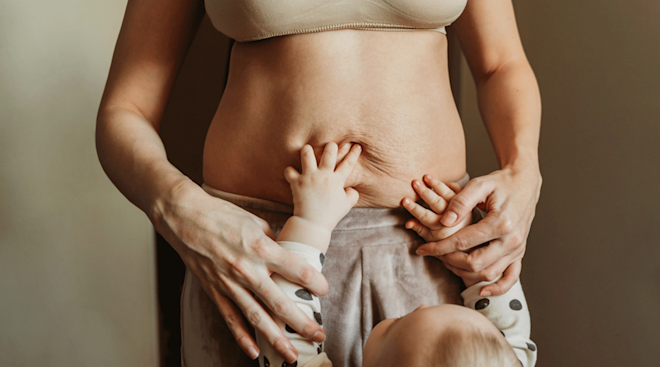9 Hardest Things About Being a New Mom
After my daughter popped out at 8 pounds, 2 ounces, I stared at my still-protruding belly in shock, and cried when a man asked me when I was due—two weeks after I had delivered. I cried pretty often back then: news stories, Kleenex commercials, at one wrong word said by my husband. I spent my days at home, wishing I could get some sleep and lying to my friends who called to ask if everything was okay. I was exhausted, hormonal and grumpy, and I felt trapped in my house, wondering if I’d ever feel normal again. I knew those first weeks with baby would be hard, but I didn’t know how hard. Here are the top challenges new moms can expect to face, and how you can get through it all in one piece.
Giving birth is a physical feat, and it’s not uncommon for new moms to experience swelling, hemorrhoids or stitches after a vaginal tear or c-section. “Women think they’ll never feel normal again, but they will,” says Karen Deighan, MD, chair of Obstetrics and Gynecology at Gottlieb Memorial Hospital of Loyola University Health System in Melrose Park, Illinois. Ice packs, witch hazel pads and a peri bottle can help with some of these discomforts. For the rest, you’ll just have to wait it out as your body heals, making sure you get proper nutrition and rest so you’re on the road to a full recovery. Ask your partner, friends or family members for help with baby and other tasks when you’re sore or hurting. And don’t try to push yourself, even though you want to do it all.
Everyone warns you that you won’t be sleeping, and they aren’t lying. During the first few weeks, baby will spend their days and nights eating about every two hours—and that’s an optimistic number! Just when you’re about to drift off to sleep for the third time that night, you’ll hear the cry of your hungry newborn waking you again. Imagine your alarm clock going off every few hours for five weeks straight. Not fun.
“Understand that sleep deprivation is going to be there. You’re going to be tired,” Deighan says. And we’re not talking the kind of tired you feel when you stay up to watch the Oscars and have an 8:30 a.m. meeting the next day. This new type of exhaustion may cause headaches, depression, irritability, memory problems and confusion.
How can you manage with disrupted sleep? The age-old advice rings true: Sleep whenever you can! But you might need some help. Ask friends and family to step in while you get in a power nap, or try guided meditation to help you log more shuteye. Plus, it’ll help you de-stress too.
That meltdown you had while shopping for the perfect crib is nothing compared with what you’re in store for. Expectant parents spend a ton of time gathering supplies and setting up the nursery for baby’s arrival, but many find themselves unprepared for the emotional ups and downs that the postpartum period typically brings. “Progesterone levels decrease dramatically when you drop your placenta, and new mothers are in a very low hormonal state” after giving birth, says Yvette LaCoursiere, MD, assistant professor and associate residency director in the Department of Obstetrics, Gynecology and Reproductive Sciences at University of California, San Diego School of Medicine. She adds that the “baby blues”—the moodiness that goes along with that hormone flux—happen in 80 percent of women. Add those whacked-out hormones to a serious lack of sleep, and you’ll feel pretty low for a couple weeks.
Lean on your support system and take heart knowing that it’s a temporary transition. If you continue to feel depressed, panicked, disinterested and/or distracted, it could be signs of postpartum depression. Make sure to talk with your doctor about what you’re experiencing and what the best course of treatment might be.
Many women are shocked to learn they’ll still look pregnant after delivering. “I tell women to bring pregnancy clothes to wear home from the hospital, since they’ll look about seven months pregnant when they leave,” says LaCoursiere. It took nine+ months for your body to grow a child, so it’s no wonder postpartum recovery takes time. Don’t silently criticize your body—think of the amazing thing it just did: create and deliver a new tiny human!
For many moms, feeding and caring for a newborn baby will bring on the most stress. Should you nurse or bottle-feed? Is baby producing enough wet diapers? Are they still breathing? (Seriously, you will check your sleeping baby’s breath more often than you can imagine.) The questions go on and on and are all-consuming—because you’re worrying about your child, as any mom does.
Try not to let all the details stress you out. Instead, focus on what’s really important: feeding—both baby and you! “I tell new moms to be realistic about what they’ll accomplish when they arrive home with their new baby,” LaCoursiere says. “They have three basic tasks: Feed your baby, feed yourself and sometimes bathe one of you.” There’s a lot to learn as a new parent, but you’ll pick it up in no time.
If you’ve decided to breastfeed, there are a range of challenges that could arise—like baby not latching, sore, cracked nipples or low milk production. “Society makes it seem like breastfeeding is intuitive, but it’s actually more difficult,” Deighan says. The good news is, there’s help available! And seeking out help as soon as possible can lower your likelihood of long-term issues. Reach out to a lactation consultant, baby’s pediatrician or the hospital support center.
There’s now a strange creature who looks a little bit like you, sleeps nearly all the time, covers you in spit-up and poop and barely acknowledges your existence. It’s not uncommon to sometimes wonder why you haven’t bonded just yet. Reassure yourself that there’s no definitive bonding doesn’t follow an exact timeline, and sometimes it can just take a while to get to know each other. “Babies don’t smile right away, and moms won’t get immediate feedback that what they’re doing is creating a bond,” LaCoursiere says. “Babies need food, warmth and sleep—just provide these basic needs and know that the bonding will come later.” Holding and rocking your little one, making eye contact with them, singing and reading to them and getting lots of skin-to-skin contact are all ways to help nurture that connection.
The postpartum period can feel incredibly lonely while you’re at home caring for a needy newborn and navigating a new chapter of life. Emotional support will help. Turn to moms who have been there! Join a parent meet-up group, or chat with fellow moms and dads at the playground. Can’t get out of the house? Online forums—like the community at TheBump.com—can help you find other parents with similarly aged kids going through the same challenges you are.
The newborn routine can get pretty repetitive: Eat, sleep, poop, repeat, punctuated by bouts of crying. And that continues around the clock. It’s understandable why new parents often feel like they’re on a merry-go-round, and it’s easy to lose track of the time, the day, when your last shower was and even your sense of self. The first three months after birth are known as “the fourth trimester” because it will take you and baby some time to adjust to this new stage of life. But as time goes on, you’ll start to get more sleep, you’ll find a comfortable rhythm and you’ll begin to see through the mist of early parenthood to the exciting path ahead.
Please note: The Bump and the materials and information it contains are not intended to, and do not constitute, medical or other health advice or diagnosis and should not be used as such. You should always consult with a qualified physician or health professional about your specific circumstances.
Plus, more from The Bump:
Karen Deighan, MD, FACOG, is the chair of Obstetrics and Gynecology at Gottlieb Memorial Hospital of Loyola University Health System in Melrose Park, Illinois.
Yvette LaCoursiere, MD, MPH, is a board-certified ob-gyn and a professor in the department of Obstetrics, Gynecology and Reproductive Sciences at the UC San Diego School of Medicine. She is the three-time recipient of the American College of Obstetrics and Gynecology & Council on Residency Education’s National Faculty Teaching Award. LaCoursiere earned her medical degree and completed her residency at UC San Diego School of Medicine. She holds a Master’s of Public Health in epidemiology and biostatistics from San Diego State University.
Mayo Clinic, Labor and Delivery, Postpartum Care, December 2023
Penn Medicine Lancaster General Health, 7 Items to Help You Recover From a Vaginal Delivery,
March of Dimes, Postpartum Depression, March 2019
HealthyChildren.org (AAP), 3 Ways You Can Bond With Your Baby, July 2023
Navigate forward to interact with the calendar and select a date. Press the question mark key to get the keyboard shortcuts for changing dates.




















































